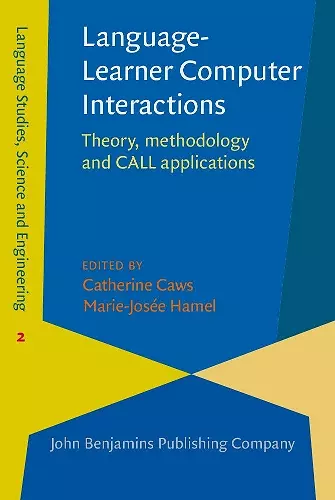Language-Learner Computer Interactions
Theory, methodology and CALL applications
Catherine Caws editor Marie-Josée Hamel editor
Format:Hardback
Publisher:John Benjamins Publishing Co
Published:14th Jun '16
Should be back in stock very soon

This book focuses on learner-computer interactions (LCI) in second language learning environments drawing largely on sociocultural theories of language development. It brings together a rich and varied range of theoretical discussions and applications in order to illustrate the way in which LCI can enrich our comprehension of technology-mediated communication, hence enhancing learners’ digital literacy skills. The book is based on the premise that, in order to fully understand the nature of language and literacy development in digital spaces, researchers and practitioners in linguistics, sciences and engineering need to borrow from each others’ theoretical and practical toolkits. In light of this premise, themes include such aspects as educational ergonomics, affordances, complex systems learning, learner personas and corpora, while also describing such data collecting tools as video screen capture devices, eye-tracking or intelligent learning tutoring systems. The book should be of interest to applied linguists working in CALL, language educators and professionals working in education, as well as computer scientists and engineers wanting to expand their work into the analysis of human/learner interactions with technology communication devices with a view to improving or (re)developing learning and communication instruments.
As of January 2019, this e-book is freely available, thanks to the support of libraries working with Knowledge Unlatched.
Language-Learner Computer Interactions presupposes knowledge base and expertise in CALL research and language education. It is addressed to novice and established members of the CALL discourse community who want to professionally develop themselves regarding the state of the art research, discussions, and future avenues of inquiry in the area of LCI [Learner-computer interaction]. The volume is an invaluable resource for those practitioners in a number of respects. It is the result of the collaborative work of high-caliber CALL editors and researchers such as Catherine Caws, Marie-Josee Hamel, Mathias Schulze, and Mike Levy to name a few whose pioneering perspectives and invaluable contributions have always furthered and enriched CALL scholarship. The focus on key disciplinary discussions including CALL ergonomics, CALL normalization (Bax, 2003), sustainability, and affordances, the selection of cutting-edge theories and methodologies, as well as thematic organization of the volume are all indicative of the comprehensive knowledge of the editors of the current conversations and concerns in this domain. These informed decisions and quality editing are the factors that distinguishes this volume from similar publications. Moreover, this interesting volume projects a multi-faceted picture of LCI research and pedagogy drawing on a nice patchwork of theoretical and methodological scholarship from various disciplines and areas including computer studies, engineering, TESOL, and applied linguistics. Furthermore, the research reported in this volume enjoys a wide and colourful array of conceptual frameworks, innovative methodological designs and approaches, and contextual diversities and variations which make the book a must-read for target practitioners globally. It also provides invaluable implications and suggestions for further inquiry in the area of LCI. Overall, the book is a very timely and welcome contribution and has done excellent justice to current discussions in this domain. -- Pejman Habibie, The University of Western Ontario, on Linguist List 28.3790 (2017)
ISBN: 9789027257512
Dimensions: unknown
Weight: 565g
257 pages